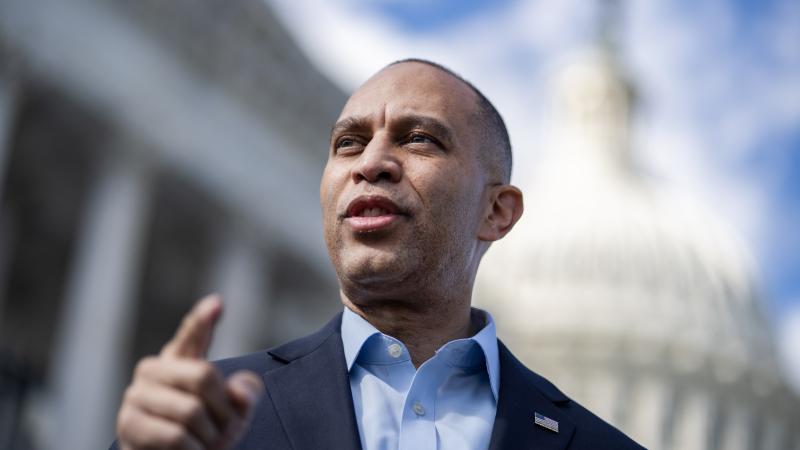Bundling emergency spending into single bill can add ‘a ton’ to national debt, watchdog warns
"There is a very real risk that they'll start with legitimate emergency spending and then they'll add more illegitimate things that have nothing to do with emergencies...and add it all to the deficit," says budget expert Marc Goldwein, addressing the White House and Democratic Senate's desire to keep Israel and Ukraine funding in one single package.
Bundling billions of dollars in funding for Ukraine and Israel's wars with humanitarian aid and other initiatives can get "expensive really quickly" and increase an already bloated deficit and national debt, according to a top expert at a federal budget watchdog group.
Marc Goldwein, senior vice president at the Committee for a Responsible Federal Budget, told Just the News that "As a general principle, I do think that Christmas tree legislation can get dangerous pretty quickly, can get expensive really quickly and we've seen that when they pile a ton of things together, you know, we sometimes end up adding a ton to the debt. I do think that often, when policies are rolled together, it creates more incentives for deficit financing."
House Speaker Mike Johnson is calling for the emergency Israel funding, estimated at $14.5 billion, to be offset with cuts to the IRS funding in the Democrats' $740 billion Inflation Reduction Act that passed last year.
Senate Republican Leader Mitch McConnell said on Tuesday that Senate Republicans are open to passing one combined package if it includes a component dedicated to border security funding, given the record number of illegal immigrant encounters occurring under Biden at the southern border.
When asked if emergency foreign assistance and war funding has been historically wrapped together in one piece of legislation, Goldwein said "it's happened every which way" over the years.
"Often politicians will package this stuff together to make it easier to get the votes or to reduce about floor time it takes, but there's no particular reason that the policy should be together or or separate," he said.
As a current example, Goldwein noted that separating the Israel funding from Ukraine into one bill at $14.5 billion "may be a lot easier" for lawmakers to "swallow even without paying for it" with some sort of offset.
"I could tell two stories, I could tell one story that you put all this stuff together to make it impossible to vote against because it's got pieces everyone likes, or I can tell the story that you can do that stuff separately, each piece seems cheap, even if they're expensive, collectively and so that makes it easier. I don't think there's a hard and fast rule about which one will lead to better or worse outcomes but I do think that we've often seen that when you package a bunch of things together, you end up adding more to the deficit," he said.
Senate Democratic Leader Chuck Schumer told reporters on Tuesday that “emergency foreign aid" for Israel and Ukraine should not be paid for with offsets, taking a different approach than Republicans.
"Emergency foreign aid should not be offset," Schumer said during a news conference on Tuesday, adding that he thinks Johnson's individual Israel funding bill isn't a serious proposal.
Goldwein warned that a comprehensive package, like the one the White House has requested at $105 billion, creates a "very real risk that they'll start with legitimate emergency spending and then they'll add more illegitimate things that have nothing to do with emergencies like broadband funding and add it all to the deficit."
The White House has requested $61 billion for the ongoing war in Ukraine, $14.3 billion for Israel, $2 billion in additional assistance for Taiwan and Indo-Pacific security, roughly $9 billion for humanitarian assistance to help "Palestinian refugees in the West Bank and surrounding areas" and $6.4 billion for U.S. border operations.
The White House also released a separate funding request for a package addressing "critical domestic needs."
"They released it as two packages for what it's worth, right, $100 billion for national security and $50 billion for domestic, but I don't think they would be upset if they ended up as one package," Goldwein said.
While existing budget rules do not require lawmakers to pay for initiatives classified as "emergencies," Goldwein emphasized that "it's still better to offset even true emergencies in particular, when the deficit itself is at least a minor emergency."
For fiscal year 2023, the U.S. government piled a whopping $1.7 trillion into the national debt, which is climbing to $34 trillion, according to the latest Treasury Department figures. The national debt was $27.8 trillion when Biden took office.
He noted that CRFB would prefer the to see an offset for emergency foreign assistance to come from a different area than IRS funding. The CRFB projected that spending $14.5 billion less on the IRS, the government's revenue collection agency, could end up costing about $25 billion in the long run.
"That's the wrong direction. I hope that they replace that IRS decision with rescinding basically any other dollar of government funding because, you know, generally, when you cut spending, it does save money," Goldwein said. "They picked the one example where it doesn't."















